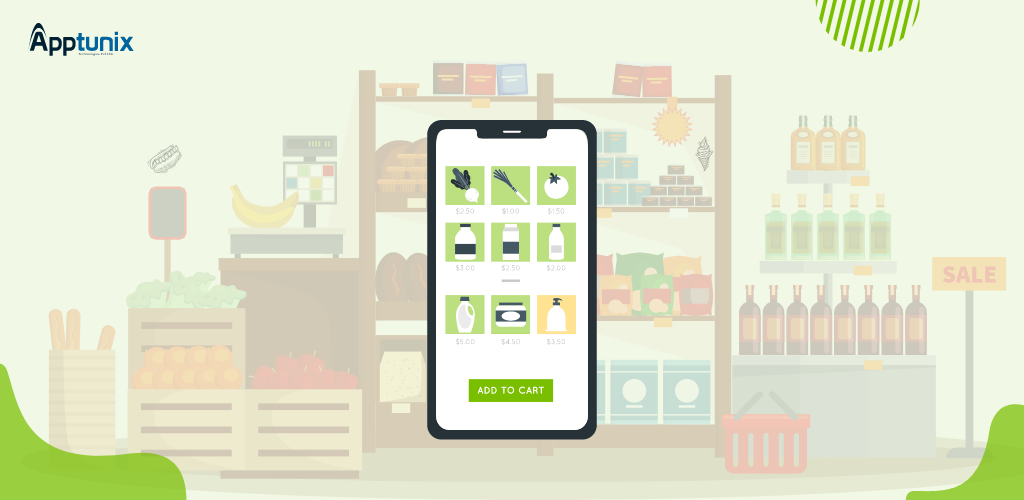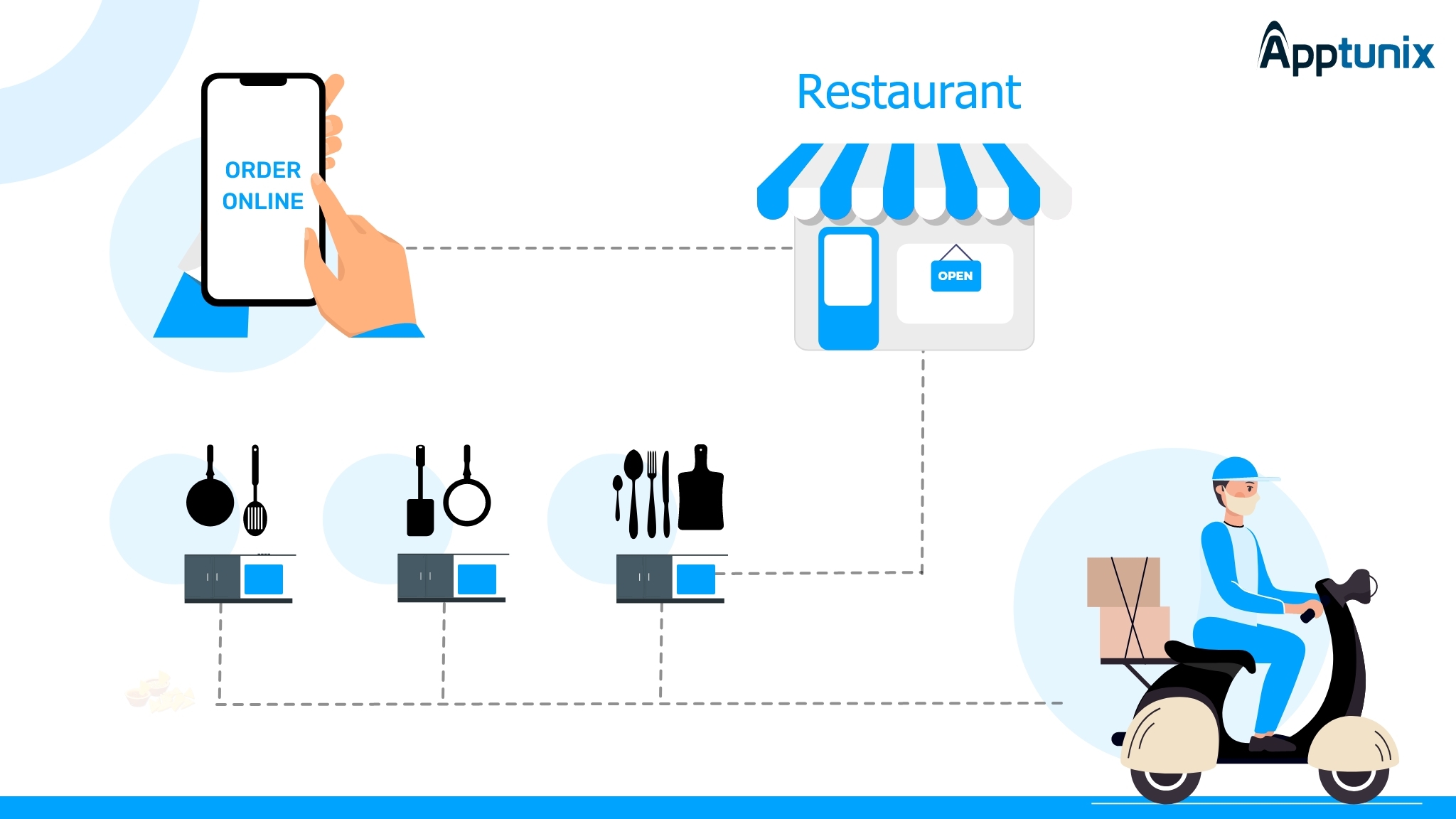Don't miss the chance to work with top 1% of developers.
Sign Up Now and Get FREE CTO-level Consultation.
Confused about your business model?
Request a FREE Business Plan.
Ecommerce Marketplace Solutions: What You Need to Know!
Table of contents

Ecommerce marketplace solutions provide a huge platform for business opportunities for multiple vendors to sell their products and provide services in this online business space. Selling goods and services in physical stores generates fewer customers and this online marketplace is a great platform to spread the business all over the world.
According to the Statistics, the global e-commerce market is expected to total $6.3 trillion in 2023.
So if you are interested in knowing more about the e-commerce marketplace or you want to boost your business with the help of online marketplace solutions like ecommerce app development – this article is for you. Without any further ado, let’s get started!

How do E-commerce Marketplace Solutions work?
E-commerce marketplaces operate on a straightforward revenue-sharing business model. Service providers and seekers engage on the online platform to sell and purchase products or services. The marketplace administrator generates revenue by applying a commission fee to each transaction conducted through the e-commerce platform.
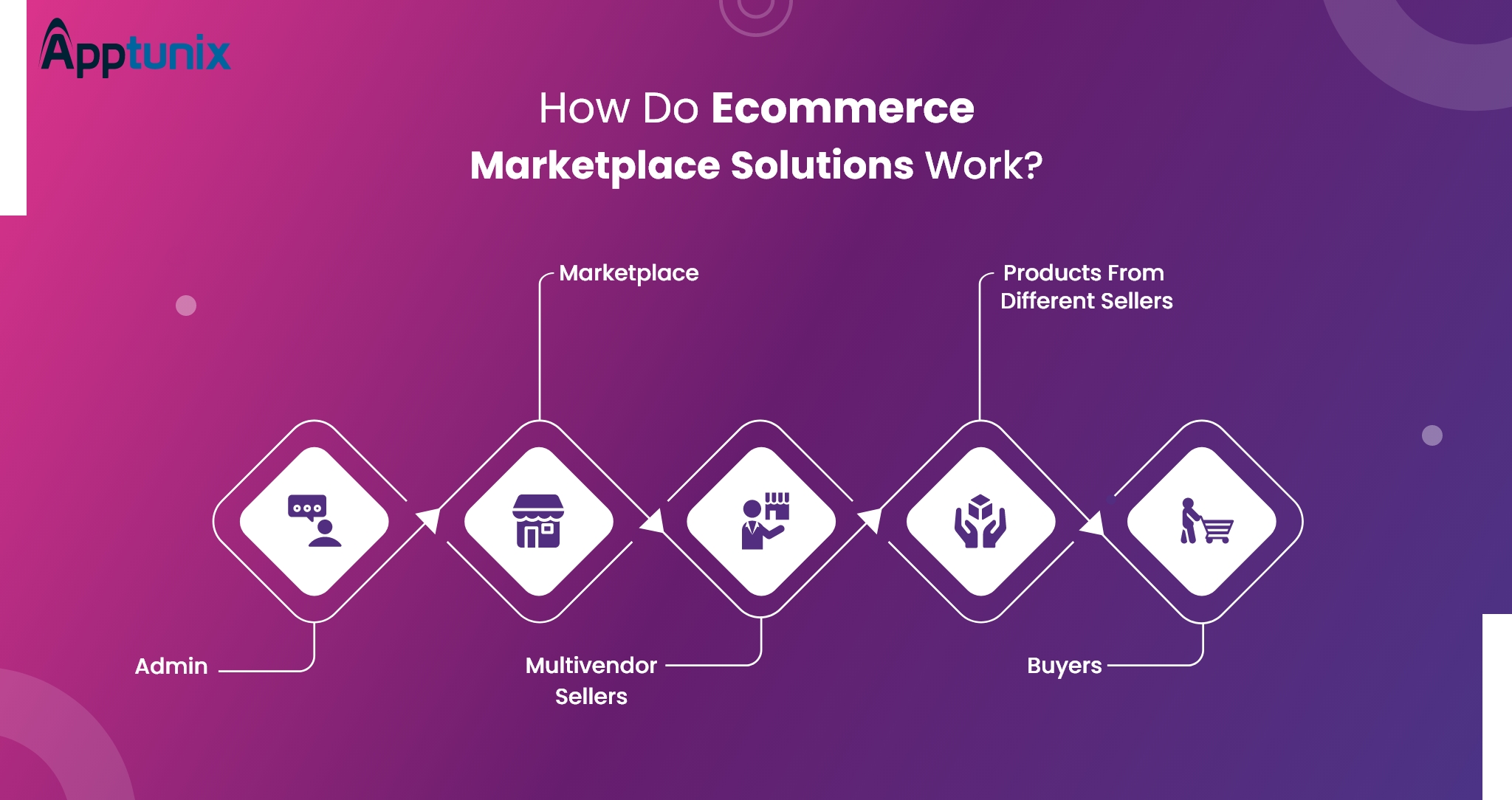
Here's a breakdown of how these solutions typically function:
1. Registration and Onboarding:
- Sellers and buyers register on the e-commerce marketplace platform.
- Sellers provide necessary details, such as product listings, pricing, and shipping information.
2. Product Listings:
- Sellers create product listings, including images, descriptions, prices, and other relevant details.
- Products are categorized for easy navigation.
3. Search and Discovery:
- Buyers can search for products using various filters and categories.
- The platform employs search algorithms to enhance product discovery based on user preferences and behavior.
4. Transaction Process:
- Buyers add products to their cart and proceed to checkout.
- The platform facilitates secure payment transactions through various payment gateways.
- Order confirmation and payment receipts are sent to both buyers and sellers.
5. Order Fulfillment:
- Sellers are notified of incoming orders and initiate the shipping process.
- Buyers receive tracking information to monitor the status of their orders.
6. Rating and Reviews:
- After receiving products, buyers can leave reviews and ratings for the sellers and the products.
- Positive reviews can enhance a seller's reputation on the platform.
7. Customer Support:
- The platform provides customer support for queries, disputes, or assistance with transactions.
- Sellers may also have access to support for any issues related to their listings.
8. Payment Settlement:
- The e-commerce platform manages the financial transactions and may hold funds until the buyer confirms receipt and satisfaction with the product.
- Payments are then settled, with the platform deducting any applicable fees.
9. Analytics and Insights:
- The platform often provides sellers analytics and insights into their performance, including sales trends, customer behavior, and inventory management.
10. Continuous Improvement:
- E-commerce marketplace solutions continuously update their features and functionalities to adapt to market trends and enhance the user experience.
How do E-commerce Marketplace Solutions Beneficial To Business?
The e-commerce marketplace app is so much in demand as it has some benefits in it so that it covers millions of customers. Each component has a broader range of merits that comes with the eCommerce marketplace business model which we will discuss here.
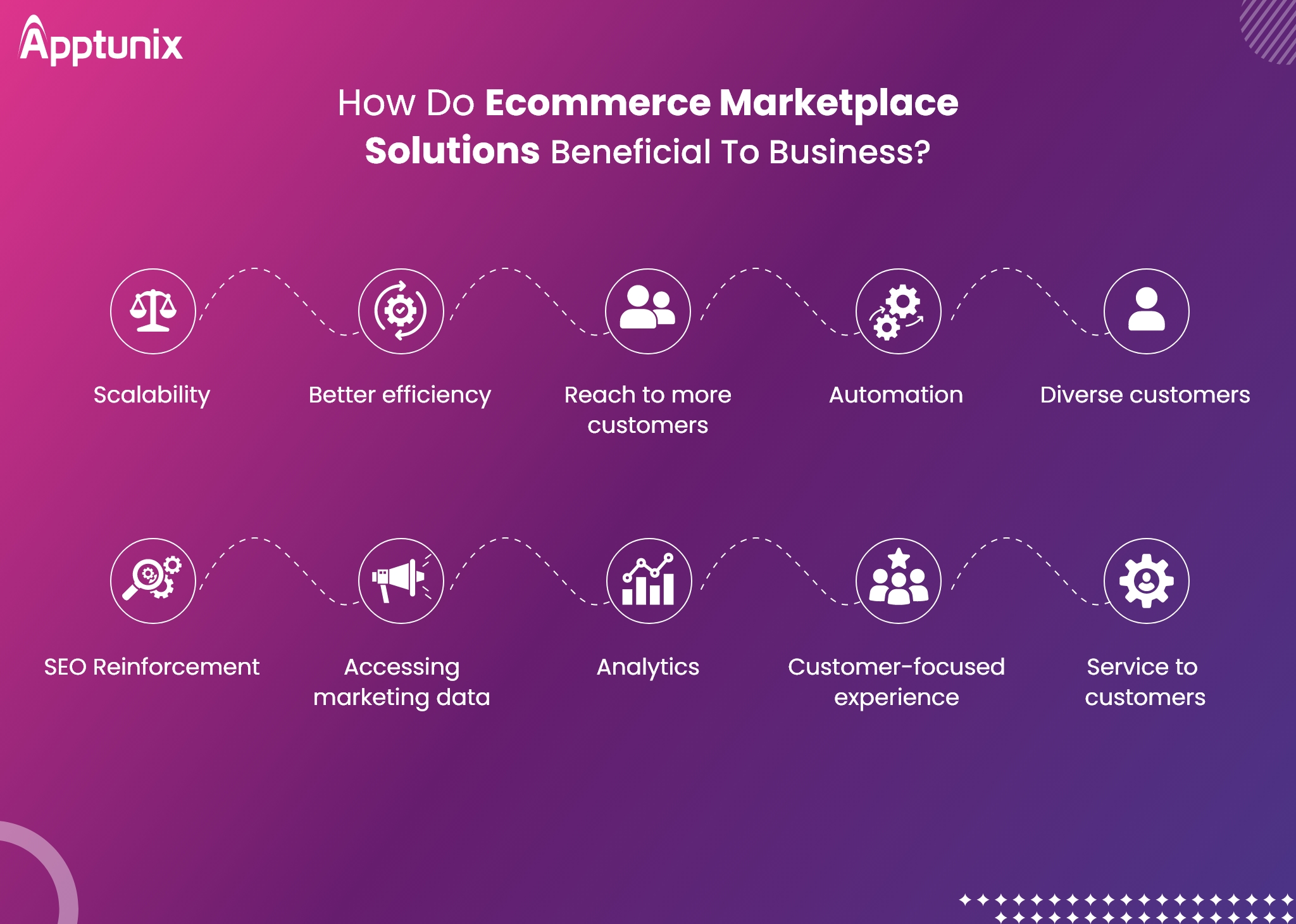
1. Scalability
E-commerce Marketplace Solutions offer significant scalability benefits to businesses. The inherent structure of a marketplace allows for the easy addition of products, sellers, and features as the business grows. This adaptability ensures that the platform can seamlessly accommodate an increasing volume of transactions, a growing product catalog, and a larger user base without compromising performance.
Scalability is crucial for businesses aiming to expand their operations and capitalize on market opportunities without facing the limitations often associated with traditional e-commerce setups.
Also Read: eCommerce App Development in 2024: Steps, Cost, Tech Stack
2. Better Efficiency
Efficiency is a hallmark of eCommerce mobile app builder. These platforms centralize operations, streamlining processes such as inventory management, order processing, and payment transactions. The consolidated nature of the marketplace enhances the overall operational efficiency, reducing redundancies and minimizing manual interventions. This efficiency translates into quicker and more streamlined customer experiences, as well as optimized backend processes for sellers.
3. Expand Reach to Customers
E-commerce marketplaces serve as powerful tools for expanding a business's reach to customers. By joining a well-established platform, businesses gain access to a ready-made audience, eliminating the need for extensive marketing efforts to attract customers.
The diverse customer base within the marketplace provides sellers with an opportunity to tap into new markets and demographics, fostering growth beyond their initial target audience.
eCommerce marketplaces serve as powerful platforms for sellers to expand their reach to customers by:
- Enhancing visibility through marketing efforts,
- Leveraging SEO benefits,
- Enabling cross-selling,
- Facilitating international expansion,
- Reaching mobile users,
- Utilizing customer retention tools, and
- Offering marketing support.
These collective advantages make marketplaces a valuable channel for businesses looking to grow their customer base and increase sales.
4. Automation
Automation is a key feature of E-commerce marketplace solutions. These platforms leverage technology to automate various aspects of the e-commerce process, including order fulfillment, payment processing, and inventory management. Automation not only saves time and reduces manual errors but also enhances the overall reliability and speed of transactions, contributing to a more efficient and user-friendly experience.
5. Diverse Customers
E-commerce marketplaces attract a diverse range of customers with varying preferences and needs. This diversity is advantageous for businesses as it broadens their potential customer base. Sellers can showcase their products to a wider audience, increasing the likelihood of attracting customers with different purchasing behaviors and preferences.
6. SEO Reinforcement
Established e-commerce marketplaces often possess strong domain authority and high visibility on search engines. By listing products on these platforms, businesses benefit from the marketplace's SEO strength, making their products more discoverable in search engine results. This reinforcement enhances the online visibility of individual sellers, contributing to increased organic traffic and potential customer acquisitions.
7. Accessing Marketing Data
E-commerce Marketplace Solutions provide valuable insights through access to marketing data. Sellers can leverage analytics tools to understand customer behavior, preferences, and trends. This data-driven approach enables businesses to make informed decisions regarding product offerings, pricing strategies, and marketing campaigns, fostering more effective and targeted promotional efforts.
8. Analytics
Comprehensive analytics tools integrated into E-commerce Marketplace Solutions empower businesses with actionable insights. Sellers can track key performance indicators (KPIs), monitor sales trends, and assess the effectiveness of marketing strategies. This data-driven approach facilitates informed decision-making, allowing businesses to optimize their operations, identify growth opportunities, and stay ahead of market trends.
9. Customer-focused Experience
E-commerce marketplaces prioritize providing a customer-focused experience. The centralized platform allows customers to explore a wide range of products in one location, simplifying the shopping process. Features such as reviews, ratings, and personalized recommendations enhance the overall customer experience, fostering trust and satisfaction.
10. Enhanced Customer Service
E-commerce online marketplace app development Solutions often include robust customer service features. Sellers benefit from the platform's customer support infrastructure, which handles queries, resolves disputes, and ensures a positive post-purchase experience. This shared responsibility for customer service contributes to a more efficient and reliable support system for both buyers and sellers within the marketplace.
10 E-Commerce Marketplace Features that Attract Your Users
The Ecommerce marketplace's amazing features will help you to attract a huge user base to your eCommerce app or website. Following, we’ve listed crucial eCommerce marketplace features that you can incorporate:
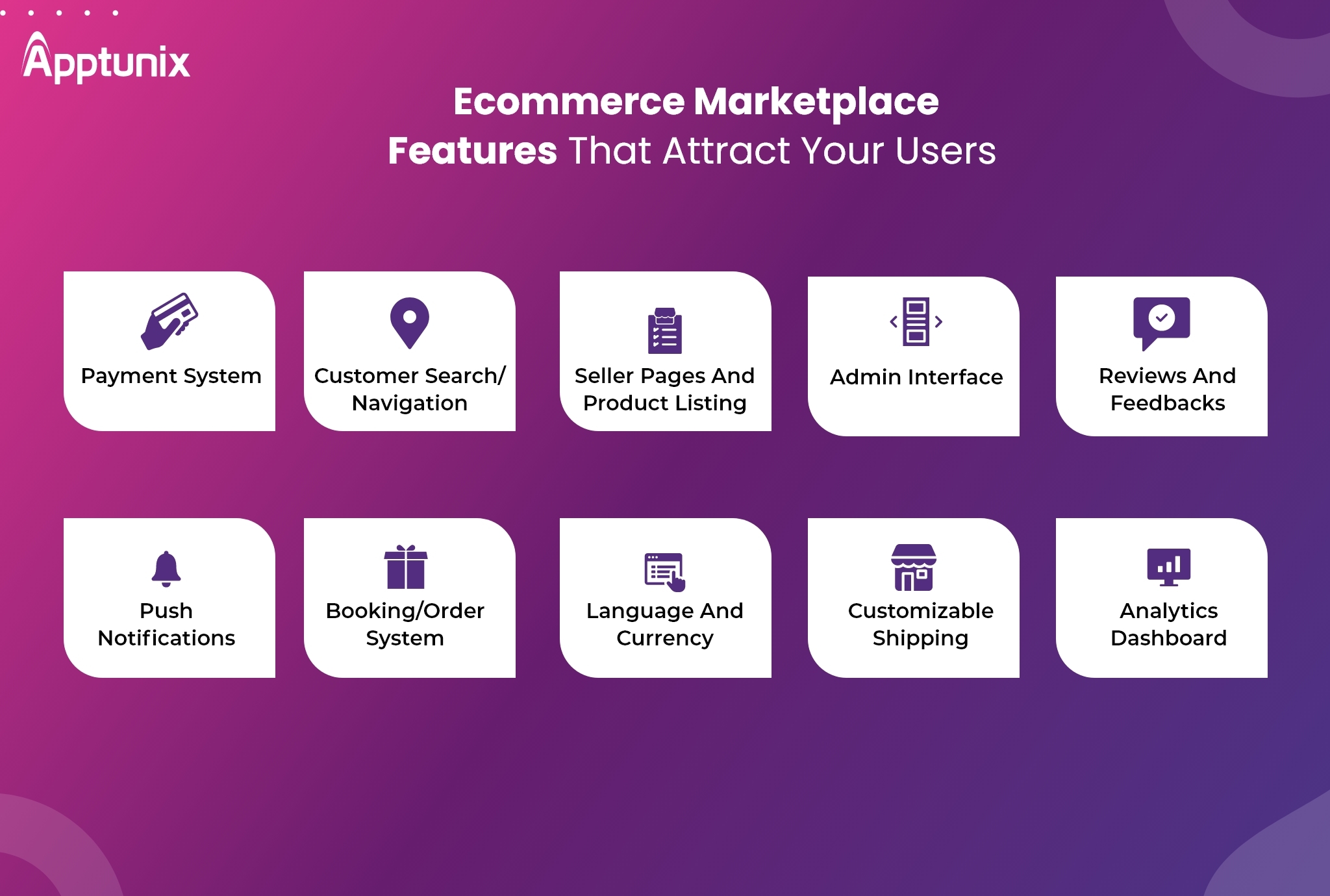
1. Payment System
It is the most crucial feature of the e-commerce marketplace solutions. Without it, no transactions between buyers and sellers could be possible. It helps sellers see the status of payments, check the marketplace operator’s commission, and process refunds
2. Customer Search/Navigation
This feature helps navigate the buyers who are unsure of what they need or want with the filter option where they can easily choose the product of their choice.
3. Seller Pages And Product Listing
Ecommerce marketplace service providers assist the customers with creating posting layouts that can oblige different pictures of the item, definite portrayals, and even geolocation when required.
4. Admin Interface
It allows monitoring and making the necessary adjustments to support the customers. The admin interface can monitor activity on the platform and issue alerts when the terms of service are being violated.
5. Reviews And Feedbacks
The merchants can look at the audits and evaluations of their items and report irrelevant reviews. An administrator can take a look at the detailed feedback and erase them.
Also Read: Cost to Build an eCommerce App Like 6th Street: A Comprehensive Guide
6. Push Notifications
Push Notifications enable real-time communication with users, providing instant updates on promotions, order statuses, and important announcements.
For buyers, push notifications ensure they are informed about order confirmations, shipment tracking, and special offers, enhancing their overall shopping experience.
On the other hand, sellers can use push notifications to alert customers about new products, discounts, or important updates, fostering customer engagement and retention.
7. Booking/Order System
The Booking/Order System is the backbone of any e-commerce marketplace solutions. It allows users to seamlessly place orders or book services directly through the platform.
This feature streamlines the purchasing process, providing a user-friendly interface for customers to browse products or services, add them to their cart, and proceed to secure checkout.
For sellers, the order system facilitates efficient order management, inventory tracking, and order fulfillment, ensuring a smooth and organized workflow.
8. Language And Currency
The Language and Currency feature enhances the accessibility and global reach of an e-commerce marketplace. Users can select their preferred language, making the platform more user-friendly and accommodating to a diverse audience.
Additionally, the ability to switch between different currencies simplifies international transactions, catering to a global customer base. This feature is essential for creating a personalized and inclusive shopping experience for users around the world.
9. Customizable Shipping
Customizable Shipping is a pivotal feature that allows sellers to tailor their shipping options based on their business needs. Sellers can set shipping rates, delivery timeframes, and shipping methods, providing flexibility for different types of products and customer preferences.
Moroever, this feature is vital for accommodating diverse seller requirements and ensuring that customers have transparent information about shipping costs and delivery timelines during the checkout process.
10. Analytics Dashboard
The Analytics Dashboard is a comprehensive tool that provides valuable insights into the performance of an e-commerce marketplace. It includes key metrics such as sales trends, customer behavior, and inventory turnover.
Sellers can analyze data to make informed decisions, optimize marketing strategies, and identify areas for improvement. The analytics dashboard empowers both administrators and sellers with a clear understanding of the marketplace's health and areas of growth potential.
Components of Ecommerce Marketplace Solutions
Incorporating important components in the eCommerce marketplace model will help your online businesses run efficiently and smoothly. Following, we’ve listed some crucial components – let’s learn!
1. Shipping & Delivery Management
This component involves the efficient management of shipping and delivery processes within the e-commerce marketplace management solution. It includes functionalities such as real-time tracking, order fulfillment, and logistics coordination. Shipping and delivery management ensures that products reach customers promptly and securely, contributing to a positive customer experience.
2. Mobile Application
A mobile application is a dedicated platform that allows users to access the e-commerce marketplace from their smartphones or tablets. Mobile apps offer a user-friendly interface, push notifications, and enhanced features tailored for on-the-go shopping. Having a mobile application broadens the reach of the marketplace, catering to users who prefer the convenience of mobile shopping.
3. Multiple Payment Methods
E-commerce marketplace solutions should support a variety of payment methods to accommodate diverse customer preferences. This includes credit/debit cards, digital wallets, bank transfers, and other online payment options. Multiple payment methods enhance customer convenience, providing flexibility in how users choose to make transactions.
4. CRM Software
Customer Relationship Management (CRM) software is essential for managing interactions and relationships with customers. In the context of an e-commerce marketplace, CRM software helps track customer behavior, preferences, and purchase history. This information can be utilized to personalize marketing efforts, improve customer support, and enhance overall customer satisfaction.
5. Rate & Review
The Rate & Review feature enables customers to provide feedback on products and services they have purchased. It contributes to transparency and builds trust within the marketplace. Positive reviews can attract more customers, while constructive feedback helps sellers improve their offerings. This feature is integral for creating a community-driven and trustworthy marketplace.
6. Easy Navigation
Easy Navigation refers to an intuitive and user-friendly interface that allows customers to browse and find products effortlessly. Clear categorization, a well-organized menu, and a straightforward search function contribute to a seamless user experience. Easy navigation ensures that customers can quickly locate and explore products of interest.
7. Analytical Dashboard
The Analytical Dashboard provides a comprehensive overview of key performance metrics and data related to the e-commerce marketplace. It includes insights into sales trends, customer behavior, and inventory management. The dashboard empowers administrators and sellers with actionable information for informed decision-making and strategic planning.
8. PWA (Progressive Web App)
A Progressive Web App is a type of application delivered through the web that offers a mobile app-like experience. PWAs combine the best features of websites and mobile applications, providing fast loading times, offline functionality, and the ability to be added to a user's home screen. Implementing a PWA enhances the accessibility and engagement of the e-commerce marketplace across various devices.
The leading e-commerce platforms like Flipkart, and AliExpress have used this technology and have experienced an uplift in their sales and profits.
For AliExpress, PWA helped conversion rates increase by 104%. On the other hand, PWA has also increased the average time spent on Flipkart’s website by a factor of 3.
Conclusion
The e-commerce marketplace solutions stand as a flourishing venture in today's business landscape, holding immense promise for the future generation. Embarking on this business journey now presents an opportunity without inherent risks or uncertainties.
For those eager to initiate or expand their online business leveraging e-commerce marketplace solutions, feel free to connect with us. Apptunix is one of the leading eCommerce marketplace development companies that will help guide you in developing or enhancing your online presence with the aid of these powerful solutions. Partnering with top marketplace app development company will take your business to the next level.
Rate this article!
Join 60,000+ Subscribers
Get the weekly updates on the newest brand stories, business models and technology right in your inbox.

You may call me an internet explorer having multiple marketing skills as well as some technical skills and develop exciting blogs. Being a Content Writer, I like to traverse through the Business platforms as well. You can find me understanding or playing with the words in my blogs.

Telemedicine 2.0 - A Comprehensive Guide On What Healthcare Providers Need To Know?
Discover how the latest advancements like Artificial Intelligence in telemedicine are reshaping patient care. This comprehensive resource offers insights into the key trends and innovations driving this shift, providing valuable knowledge for healthcare professionals looking to stay ahead.
Download Now!Subscribe to Unlock
Exclusive Business
Insights!
And we will send you a FREE eBook on 'Mastering Business Intelligence.

